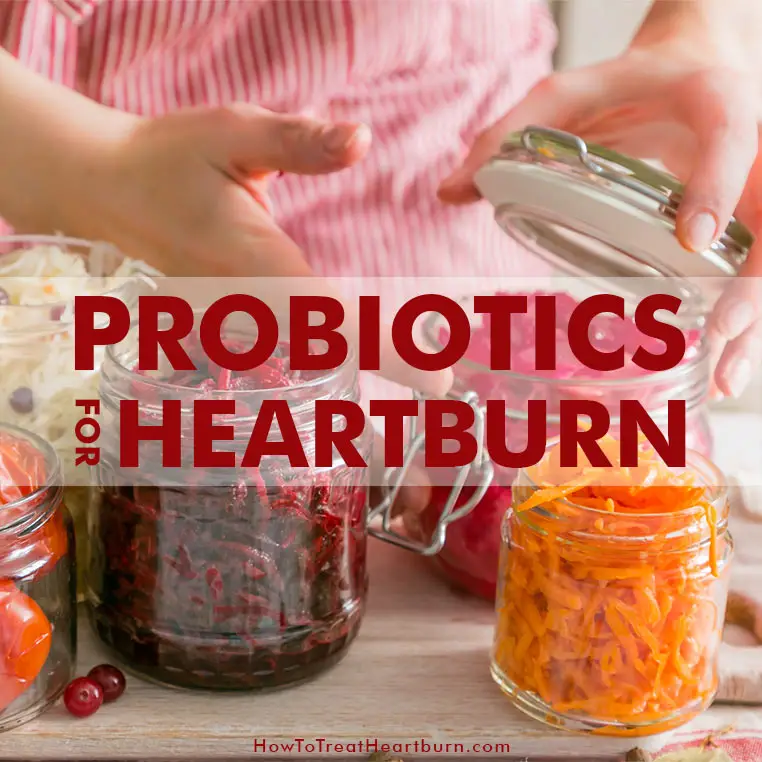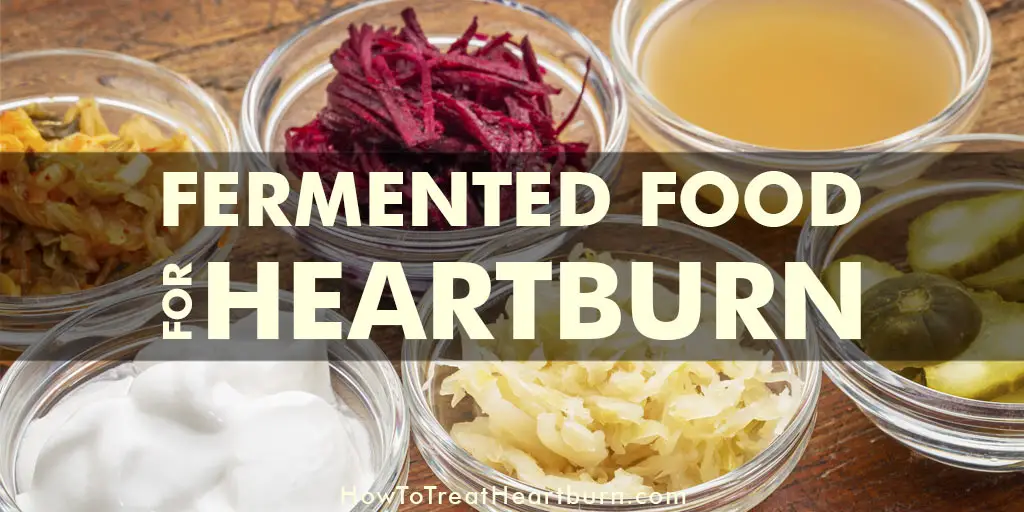Disclosure: I am compensated for purchases made through some links on this site. Click for details.
What are Probiotics?
Probiotics are microorganisms, live bacteria, and yeasts, that aid in digestion and improve our overall health. Probiotics are considered to be healthy bacteria or good bacteria. There are both good bacteria and bad bacteria in our digestive systems.
Maintaining a proper balance of intestinal bacteria is crucial for digestive health. When the digestive system is functioning properly, overall health improves dramatically.
Probiotics and Acid Reflux
Heartburn is the pain caused by acid irritation in the esophagus. One of the main causes of acid reflux is from impaired digestive functionality. Probiotics improve digestive function and reduce the risk of acid reflux.
Lack of Probiotics Can Lead to Heartburn
How can the lack of probiotics lead to heartburn? When the digestive tract lacks good bacteria, an overgrowth of bad bacteria can occur leading to various digestive conditions that cause acid reflux.
Production of Gas in the Intestines
Bad bacteria produce methane and hydrogen gas in the intestines causing upward pressure on the stomach and ultimately the lower esophageal sphincter (LES). The LES is a ring of muscle that closes the keep stomach contents from refluxing into the esophagus. Added pressure on the LES can weaken the closer causing acid reflux.
Gas can also lead to belching. As gas produced by bad bacteria passes through the LES so can stomach acid.
Stomach Acid Reduction
Bad bacteria reduce acid levels in the stomach. When suffering from heartburn, a reduction in stomach acid sounds great, but low acid levels can actually cause acid reflux. Adequate acid levels are needed for both proper digestion and to trigger the LES to close. If the LES doesn’t close properly, stomach acid will reflux into the esophagus.
Reduction in Nutrient Absorption
Bad bacteria prevent the synthesis of digestive enzymes needed for breaking down proteins into amino acids and prevent the absorption of nutrients.
The lack of digestive enzymes and nutrients cause the digestive process to be less efficient and slow.
Slowed digestion leads to greater abdominal pressure due to an increase of material in the digestive tract and also to constipation. This added pressure prevents the LES from closing and allows acid to reflux.
Benefits of Probiotics for Heartburn Relief
Digestive issues caused by bacterial imbalance tend to build on each other increasing the instance of disease in the body. How do probiotics bring balance to the digestive system and reduce the instance of heartburn?
Probiotics Prevent Bacterial Overgrowth
Probiotics fight harmful bacteria and yeast infections to prevent and eliminate bacterial infections such as small intestine bacterial overgrowth (SIBO), Helicobacter pylori (H. pylori)1 and candida overgrowth.
Probiotics Improve Stomach Acid Levels
Probiotics promote optimal stomach acid levels which will trigger the LES to close and prevent acid reflux. Optimal stomach acid levels also kill harmful bacteria and properly digest food for improved absorption of nutrients.
Probiotics Improve Food and Nutrient Absorption
Probiotics help break down food for easier digestion and increase the absorption of nutrients. These benefits reduce constipation, abdominal pressure, and pressure on the LES thus reducing the chances of acid reflux.
Probiotics Prevent Constipation
Probiotics increase gastrointestinal motility and reduce constipation:
- By eliminating bad bacteria that cause slow, inefficient digestion.
- By optimizing production of stomach acid for breaking down food.
- By improving nutrient absorption and providing the digestive system needed nutrients to function properly.
- By maintaining muscle activity which moves material through the digestive tract.
Probiotics Improve the Immune System
Probiotics boost the immune system by preventing leaky gut and helping with the production of antibodies. An improved immune system helps protect against bad bacteria overgrowth improving digestion and reducing the risk of acid reflux.
Bad bacteria can cause leaky gut by damaging the gastrointestinal tract’s mucous membrane. Leaky gut is a digestive condition where undesirable molecules pass through the wall of the intestine to enter the bloodstream to cause chronic inflammation throughout the entire body.
Chronic inflammation causes conditions such as chronic fatigue syndrome, lupus, migraines, multiple sclerosis, and rheumatoid arthritis. Chronic inflammation from leaky gut is even thought to cause autism.2
Probiotics Help Prevent Bloating and Belching
Bad bacteria produce gas which can lead to bloating and belching. Bloating and belching weakens the LES leading to acid reflux and heartburn. Probiotics reduce bad bacteria levels leading to less gas and lower risk of weakening the LES.
Probiotics Reduce Body Fat
Optimal bacteria levels created by probiotics not only help with the absorption of nutrients, it’s also been shown that bad bacteria in the digestive tract may influence body metabolism and food cravings. Raising the body’s metabolism and lowering food cravings help reduce excess weight. Obesity and GERD are strongly connected. Excess weight increases abdominal pressure which weakens the LES closure to cause acid reflux.
Taking Probiotics for Heartburn Relief
Probiotic supplements and fermented foods introduce good bacteria into the digestive system. The best source of probiotics is fermented foods and beverages such as buttermilk, kefir, kimchee, kombucha, miso, sauerkraut, sour cream, and yogurt.
Probiotic foods should be unpasteurized. Pasteurization kills bacteria. If you can’t find unpasteurized probiotics, try making your own at home. Lacto-fermented foods are simple to make and only require a few basic instruments along with salt, vegetables, and water or you can try your hand at other probiotics foods like yogurt.
Cultured Dairy Products
Cultured dairy products such as buttermilk, sour cream, yogurt, and kefir are probiotics which may need to be reintroduced later due to their lactose content. Lactose is a sugar found in dairy that will feed bad bacteria.
Also, cultured dairy products should not be taken if the possibility of heartburn is present. Dairy products can increase acid reflux symptoms. Additional stomach acid will be produced to break down calcium, fat, and protein found in these foods.
Feeding Probiotics to Keep Them Growing
What do probiotics feed on to keep them growing? Prebiotics are the food source for probiotics. Prebiotics are nondigestible carbohydrates available in supplement form and found in foods such as bananas, barley, wheat, oats, flax, beets, carrots, garlic, leeks, legumes, onion, artichokes, asparagus, radishes, and more.
Bad bacteria feed on sugar, processed foods, animal fats, and animal protein. These foods should be kept to a minimum.
Conclusion of Probiotics for Heartburn Relief
Probiotics and prebiotics help keep the digestive system healthy and function properly by keeping bad bacteria in check. A lack of probiotics in the intestines can lead to numerous digestive conditions that can lead to acid reflux and heartburn. For many people, unpasteurized probiotic-rich, fermented foods can eliminate chronic acid reflux and the instance of heartburn, thus eliminating the need for heartburn medications like Proton Pump Inhibitors. If probiotic-rich foods aren’t readily available, probiotic supplements are the next best thing.

References
1) Matjaž Homan, & Rok Orel. “Are probiotics useful in Helicobacter pylori eradication?.” National Center for Biotechnology Information, U.S. National Library of Medicine, World Journal of Gastroenterology , October 7, 2015.
2) Melinda Wenner Moyer. “Gut Bacteria May Play a Role in Autism.” Scientific American, September 1, 2014.




Hi Steve, I was prescribed amoxicillin clauvinate with potassium for a 20 day course (1 pill every 12 hours) and during that period I dealt with a lot of nausea in the middle of the night and constipation. A weeks after the course was finished, I started getting acid reflux and developed a little swelling in the throat as well as a cough. I have been on a probiotic since the last week of my treatment so I am worried that my symptoms seem to have worsened. I used to get a little heartburn every couple months or so that would go away in a day; nothing major. I’m very thin, don’t drink/smoke, no real food allergies and I’m wondering if running a 14 day course of Prilosec OTC would be a good idea while I continue to try to rebuild my gut bacteria through my daily probiotic and fermented foods (as well as any other ways of rebuilding good gut bacteria you would recommend). There is always the possibility that the reflux is unrelated to the antibiotic but I doubt it since it was the strongest one I’ve ever been on and I dealt with the constipation and reduced appetite during the course. Also, the nausea happening at night when acidity is at its highest concentration in the stomach also makes me suspect it. Anyways, I would appreciate it if you could get back to me about Prilosec helping to ease the symptoms as well as reduce any damage being done while hopefully breaking the cycle of irritation, and maybe any other gut rebuilding ideas I am unaware of?
Thank you
Hello Alex, thank you for reading and making contact. It’s best to speak with your doctor to see if you need to be on something as strong as Prilosec OTC, a proton pump inhibitor (PPI). PPIs can have an acid rebound effect when you discontinue use. Heartburn medications do help with heartburn and help prevent damage to the esophagus. They can be great to use while healing. Ask your doctor if you can get by with an H2 blocker or antacid instead of a PPI. Things to consider… Stomach acid is required for getting the lower esophageal sphincter to close and the lack of acid can cause bad bacteria to grow in your digestive tract. The bad bacteria will be battling the probiotics you introduce and can be a cause of acid reflux. If you’re open to trying natural remedies, you might like deglycyrrhizinated licorice (DGL). DGL can soothe heartburn and is scientifically proven to strengthen the LES closure to keep acid in your stomach. DGL is one of the top products that helped me get over GERD. We are all different. Your doctor will be your best source of advice. Best wishes!
Thank you for a speedy reply. I tend to shy away from drugs of any nature but if the symptoms continue I will ask for those H2 blockers. Do you think Apple Cider Vinegar would interfere with that esophageal soothing/rebuilding? I figured I would dilute some and take it in the morning to treat my suspected hypochlorhydria and I figure as long as it doesn’t feel uncomfortable I probably have nothing to worry about. I will ask my doctor like you recommend so no pressure I was just wondering if you had any opinion at all on the topic of apple cider vinegar.
Also, I ordered these: Thorne-Research-GI-Encap-Botanical-Supplement
I am unsure of the dosage so I thought you might have an idea of how many/when to take but if not again, I can call the company or ask my PCP. Either way, thank you for your help!
All the best,
Alex
Hey Alex,
Happy to be of help! 🙂 I’ve used apple cider vinegar. It will set your throat on fire. It should help with pH balance and is used to shock the LES into closing. From the responses I see, it works for some people but not others. That’s how it is with many natural heartburn remedies. From my personal experience, I felt like I was doing myself good by improving my pH levels but I did not have an immediate improvement in acid reflux or heartburn symptoms.
With the Thorne Research GI Encap Botanical, they recommend taking 1-2 capsules with each meal or as recommended by a health-care practitioner. My thought is to take it around 10-15 minutes before meals if possible to give it time to coat your stomach. If your doctor has any thoughts on it, I’d follow their recommendation.
Have a great day!
The store bought buttermilk..Does this have probiotics… I was told only unpasteurized buttermilk does…Can’t buy that here in Virginia… 🙁
Hi Shirley, the normal store-bought buttermilk has been pasteurized to kill both the good bacteria (probiotics) and the bad bacteria as well. Unpasteurized products like buttermilk can be hard to find. Many states do not currently allow the sale of raw milk products at retail stores.
Thank you for writing this article! I really appreciate that it’s direct and not overly ‘wordy’
I just finished making my first batch of Korean fermented cabbage known as “Kimchi”
It’s very very easy to make. And it’s much less expensive than capsules of probiotic!
Hello Louis! Thank you for reading and your comment! So glad you made some Kimchi. Making your own probiotics is less expensive and better. It’s fun to make them too or at least I think so. I find the process fascinating. Best of health!
Thank you so much for this article! I’ve been experiencing reflux for a few months now and the burn is getting pretty annoying. I highly suspect that it has got to do with my diet and the way I eat (since I live a very hectic schedule). I’ve decided to slow things down and try to make sure that I eat in smaller portions to ease my gut/digestion process. Your article have made sense out of me that live cultures can help, and I happen to love yogurt. I also chanced on a source that fermented cheese, miso soup and sourdough bread can help. Is this true? I am trying to collate a good list of food sources which contains probiotics to address my acid reflux problem.
Hello Emily, fermented cheese, and miso soup can be sources of probiotics. Sourdough bread would not be a source of probiotics. Sourdough bread starter contains Lactobacilli, a beneficial probiotic that allows the slow rise of the bread without the addition of any yeast. Prior to baking sourdough bread dough goes through a fermentation process and is rich in probiotics. The heat of the baking process, however, kills off the probiotics just as the pasteurization process kills good bacteria in yogurt.